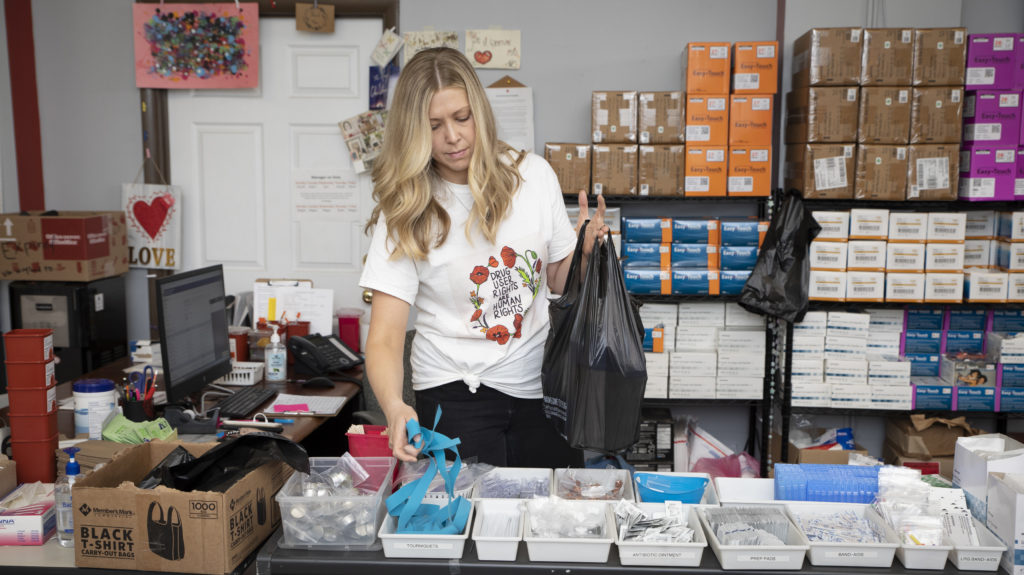By Julie Rwan and Kyli Rodriguez-Cayro
Communities across the United States are struggling with the overdose crisis. This past year, more than 100,000 lives were lost in the United States to a preventable overdose. In 2019, New Mexico had the 12th highest rate of overdose deaths in the country—41% percent above the national rate.
In February, the New Mexico legislature passed important overdose prevention legislation that focuses on expanding legal access to harm reduction interventions, such as fentanyl test strips. This legislation comes at a time when overdose deaths in the United States are at an all-time high. Every 14 hours, someone in New Mexico dies of an overdose.
Harm reduction strategies and interventions, which are already underway in New Mexico, prioritize health and safety of people who use drugs with tools like naloxone for overdose reversal, medications for opioid use disorder, and syringe service programs for safer drug use.
The new legislation, House Bill 52, amends the Harm Reduction Act, a 1997 bill that authorized syringe services programs in New Mexico, by expanding access to drug checking supplies such as fentanyl test strips. The bill states that certain supplies are not a violation of the New Mexico Controlled Substances Act, which is a state statute establishing drug policies to regulate the possession, use and distribution of certain substances and equipment.
The bill authorizes the New Mexico Department of Health to add fentanyl test strips along with other drug checking devices for public distribution through harm reduction programs. Drug checking devices give more people information about substances in drugs they plan to consume. Research has shown that fentanyl test strips are an important tool to significantly reduce overdose. When people are given access to fentanyl test strips, they use less of a substance, consume substances at a slower pace and choose not to use substances alone—all strategies that, when implemented, can prevent overdose. As fentanyl-involved overdose deaths steadily increase across New Mexico, this legislation eliminates key barriers to life-saving harm reduction tools.
The new legislation also allows harm reduction programs to provide items used to consume and prepare substances, such as sterile smoking supplies, as approved by the New Mexico Department of Health. In addition, House Bill 52 broadens the definition of “participant” beyond people who inject drugs using syringes to include people who receive any kind of supplies or services from state harm reduction programs. This is a crucial step in providing people who use drugs with resources and support, regardless of whether they smoke, snort, inject or otherwise consume drugs. Legislation such as this paves the way for the future bills that support the use of best practices and evidence-based harm reduction strategies to reduce overdose.

Harm reduction interventions such as drug checking are cost-effective and supported by research. Most importantly, harm reduction interventions save lives. New Mexico is the largest and latest state working in partnership with Vital Strategies’ Overdose Prevention Program. The Overdose Prevention team looks forward to continuing to work with our partners, including the New Mexico Department of Health and harm reduction advocates across the state, on future harm reduction initiatives to end preventable overdose.
Vital Strategies has worked on harm reduction efforts since 2018 and most recently launched “Support Harm Reduction,” the largest-ever national ad campaign focused on harm reduction. The campaign was launched with a full-page ad in The New York Times and TV and digital ads that feature people who have been saved by harm reduction. The “Support Harm Reduction” campaign is accompanied by an online, interactive memorial where people can honor and remember the lives of loved ones lost to overdose.
Learn more about our Overdose Prevention Program and follow us on Twitter at @VitalStrat.
Julie Rwan is the Senior Technical Advisor for Vital Strategies’ Overdose Prevention Program, leading work in New Mexico and Michigan.
Kyli Rodriguez-Cayro is the Content Manager for Vital Strategies’ Overdose Prevention Program.
Get Our Latest Public Health News
Join our email list and be the first to know about our public health news, publications and interviews with experts.